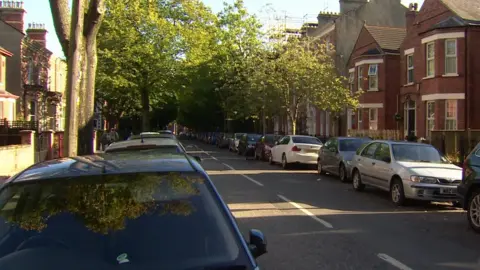Holyland students 'as bad as last year'
 Getty/jahmaica
Getty/jahmaicaA residents' group has said a reported decline in noise and anti-social behaviour complaints in student areas of Belfast is "unbelievable".
Figures show complaints during the first two weeks of the new term were 33% down on 2017.
However the College Park Avenue Residents' Association said the true situation was not being reflected.
"Freshers (week) has been just as bad as last year," said its chairwoman, Brid Ruddy.
First reported in The Belfast Telegraph, the Belfast City Council (BCC) figures show that from 24 September to 3 October 2018, 36 anti-social behaviour (ASB) complaints were received, compared to 56 during the same period last year.
These included 32 complaints about noise, two about ASB in a crowd, one about damage to property and one relating to drug litter.
The current law in the UK defines night hours as between 23:00 until 07:00 BST.
Ms Ruddy said the legislation was "insufficient" and meant residents had to listen to "all-day parties".

"People have rung during the day because there is all-day and all-night partying but the team can't come out because the legislation doesn't kick in until after 23:00," she said.
"Many friends and neighbours have stopped complaining because it's a waste of time.
"We have the highest levels of under-reporting. We do work with partner agencies.
"There is enormous noise here and I do not believe it has gone down. The number of calls may have gone down but they need to change the legislation.
In response to Ms Ruddy's comments, BCC said any changes to the legislation were a matter for the Department of Agriculture, Environment and Rural Affairs (DAERA).
It operates a "noise hotline" between 08:30 and 17:00 and between 20:00 and 04.00 to report problems and a voicemail service operates outside these times.
It added BCC residents were "free to report all ASB problems including excessive noise at any time, our officers will investigate and take the appropriate action that is required".
'Significant decrease'
In response to the improved figures from the council, Ulster University (UU) said that as well as its partnership with the PSNI, Belfast City Council, Queen's University and the Belfast Holyland Regeneration Association, it has added a new officer to engage with its students living in the local communities, as well as residents and other key partners.
It insisted new and returning students were given "a comprehensive programme of workshops and information sessions to ensure they are all fully aware of their responsibilities and the risks of engaging in anti-social behaviour".

A spokeswoman said: "UU does not tolerate anti-social behaviour and has robust disciplinary processes in place to deal with any incidences, as and when they are reported to us by the council.
"This year we have seen a significant decrease in the number of reports of anti-social behaviour from the noise team at Belfast City Council in comparison to the same time period last year and continue to investigate reports and complaints that are brought to our attention."
A Queen's University Belfast spokesperson said the number of complaints received relating to anti-social behaviour by its students has remained static over the past two years.
It has two full members of staff on the ground supported by eight staff who also cover the local area during Freshers Week and other key periods.
The university also has a "comprehensive programme of work in place to educate and support students living as part of the local community".
It works in partnership with Queen's Students' Union, Ulster University, PSNI, Belfast City Council and other key stakeholders to promote student safety and welfare.
QUB said it fully investigates any complaints or reports of anti-social behaviour and a strict off-campus disciplinary code was in place.
Belfast City Council said it had dealt with 16 complaints itself - mostly by way of verbal/informal warnings, warning notices and on occasion a warning letter.
Three referrals were made to the PSNI - two relating to noise and one in relation to ASB - and 15 referrals were also made to higher education institutions.
